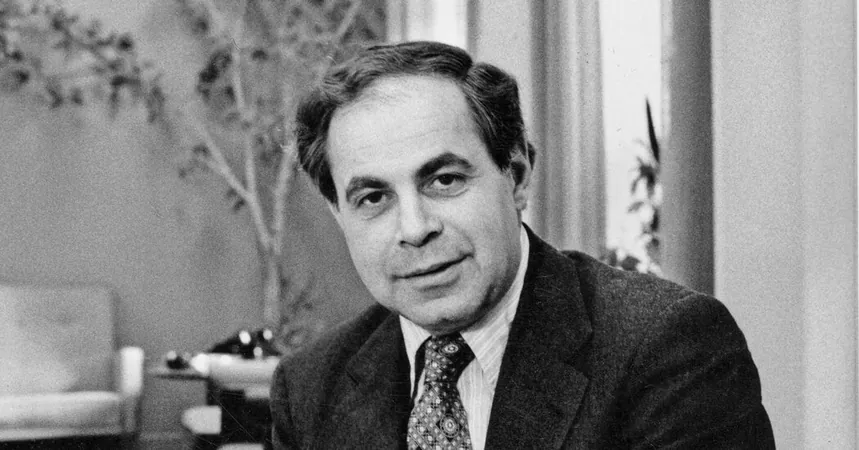
Max Frankel, Influential Times Editor and Journalistic Pioneer, Passes Away at 94
2025-03-24
Author: Ying
Max Frankel, the esteemed former executive editor of The New York Times, has passed away at 94 in his Manhattan home. Frankel, a legendary figure in American journalism, gained prominence as a Pulitzer Prize-winning correspondent and played a pivotal role in guiding the newspaper through a period of significant transformation during the latter half of the 20th century. His passing was confirmed by his wife, Joyce Purnick, a notable former editor and reporter at The Times.
Born on April 3, 1930, in Gera, Germany, Frankel's early life was marred by the rise of Nazi Germany. Fleeing persecution, he and his mother emigrated to the United States in 1940, arriving in New York without speaking a word of English. Little did he know, this would mark the beginning of a remarkable journey that would see him ascend to one of the highest positions in journalism.
Frankel's career at The New York Times began in 1952 after graduating from Columbia University, where he also started as a campus reporter at just 19 years old. Over nearly five decades, he reported on key historical events ranging from the Cuban Missile Crisis to the fall of the Berlin Wall, covering world leaders like Fidel Castro and Mao Zedong, and serving as the paper's chief of Washington Bureau during significant political upheavals, including the Watergate scandal.
As executive editor from 1986 to 1994, Frankel witnessed incredible shifts within the newspaper industry. Despite increasing readership, he faced the daunting challenge of declining advertising revenues. However, rather than retrench, he broadened the newspaper's scope, expanding coverage in metropolitan areas and incorporating color into various sections. This period also coincided with the newspaper's initial forays into digital media, heralding a new era in journalism.
An important aspect of Frankel's legacy was his innovative approach to news. He redefined what constituted news coverage, shifting it away from a mere focus on daily events to a more analytical and features-oriented perspective. In a statement reflecting his impact, Tom Goldstein, a former colleague, noted, "Max changed the notion of what news is; it was much less tied to the events of the day."
In addition to his editorial leadership, Frankel was a committed advocate for diversity within the newsroom and worked to include underrepresented voices. He made significant strides in hiring women and people of color, albeit acknowledging the slow pace of progress regarding racial diversity. His tenure also saw The Times winning multiple Pulitzer Prizes, including recognition for groundbreaking reporting on the impact of racism and poverty on American families in the series “Children of the Shadows.”
Though his editorial decisions sometimes sparked controversy, he defended his staff's integrity and journalism rigorously. Criticized for the treatment of a woman in a highly publicized case, he maintained that the paper's intention was to present a comprehensive view and later acknowledged that certain details were unnecessary.
Outside of his reporting and editorial work, Frankel was a published author and respected educator. He penned several books, including "High Noon in the Cold War," and taught journalism at various institutions, ensuring that his wealth of knowledge and experience would inspire future generations.
In his 1986 memo to the staff upon becoming executive editor, Frankel emphasized the importance of a familial bond within the newspaper, vowing to uphold a commitment to fearless reporting and quality. This spirit encapsulated his own journey from a young refugee to one of the most influential figures in American journalism.
Max Frankel leaves behind a profound legacy that shaped not only The New York Times but also the broader field of journalism, inspiring countless individuals to pursue the truth with integrity and passion. He will be remembered not just for his leadership but also for his unwavering belief in the power of journalism to inform and enlighten the public.





 Brasil (PT)
Brasil (PT)
 Canada (EN)
Canada (EN)
 Chile (ES)
Chile (ES)
 Česko (CS)
Česko (CS)
 대한민국 (KO)
대한민국 (KO)
 España (ES)
España (ES)
 France (FR)
France (FR)
 Hong Kong (EN)
Hong Kong (EN)
 Italia (IT)
Italia (IT)
 日本 (JA)
日本 (JA)
 Magyarország (HU)
Magyarország (HU)
 Norge (NO)
Norge (NO)
 Polska (PL)
Polska (PL)
 Schweiz (DE)
Schweiz (DE)
 Singapore (EN)
Singapore (EN)
 Sverige (SV)
Sverige (SV)
 Suomi (FI)
Suomi (FI)
 Türkiye (TR)
Türkiye (TR)
 الإمارات العربية المتحدة (AR)
الإمارات العربية المتحدة (AR)